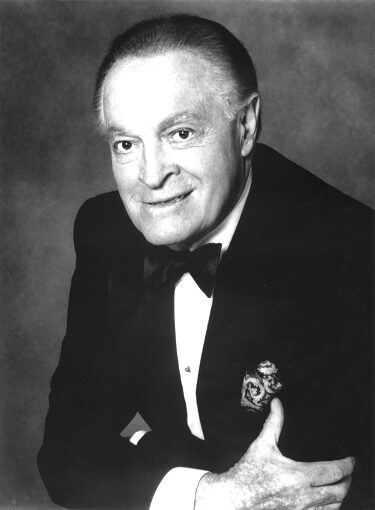Bob Hope*
Class of 1968
- Entertainer

Laughter is therapy-not only for those who laugh, but also for those of us who try to make others laugh.
The fifth of seven sons, Bob Hope was born in London in 1903. His father was a stonemason who immigrated to the United States in search of a better life. Hope was four when he arrived in Cleveland, Ohio, and he remembers his childhood as one with little money but lots of love and laughter.
Hope tried out several early careers: dance instructor, clerk, newspaper reporter, and amateur boxer. It was boxing that propelled him into show business. He was in Ohio's lightweight championship fight, trying to decide between a career as a star athlete and one as a brilliant entertainer. "That first punch knocked me right into dancing school," he once said.
Hope's show-business debut was in vaudeville as a partner in a dancing act in a Fatty Arbuckle review. His first Broadway show, Sidewalks of New York, came in 1927. He made his radio debut on Rudy Vallee's Thursday Night Show on NBC in 1934, and he then began doing the Pepsodent Show for NBC. "It was the first time millions of people had a chance to turn me off at the same time," Hope quipped.
From the roof of the New Amsterdam Theater on 42nd Street in New York in 1950, Hope broadcast his first television show. After that, hundreds of television specials and guest appearances made him one of America's most popular television stars. In Berlin in 1948, Hope did his first overseas Christmas show. Entertaining U.S. troops at Christmas then became an annual tradition that took him to military bases all over the world and won him an Emmy.
Hope's motion-picture career spanned nearly four decades, from The Big Broadcast (1938) to Cancel My Reservation (1972), and it included the famous Road pictures, in which he starred with Bing Crosby and Dorothy Lamour.
Hope received more than 50 honorary degrees and more than 1,000 awards and citations for humanitarian work and professional performance, including the Medal of Freedom. Theaters, hospital wards, schools, halls, a bridge, and a rose have been named for him.
An avid golfer, Hope developed and hosted the annual Desert Classic, a PGA tournament that has raised millions of dollars for charity. Hope said his Horatio Alger Award always meant a great deal to him. "Perseverance is the key to success," he once said. After all, if he had not persevered in vaudeville, the world may never have known "The King of Comedy."
